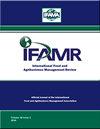从罗马尼亚消费者的角度看蜂蜜的可追溯性问题
IF 1.5
4区 经济学
Q3 AGRICULTURAL ECONOMICS & POLICY
International Food and Agribusiness Management Review
Pub Date : 2022-06-23
DOI:10.22434/ifamr2021.0145
引用次数: 4
摘要
罗马尼亚蜂蜜市场正面临着一个与可追溯性有关的问题,特别是当蜂蜜在多个国家生产,其原产地显示为欧共体和非欧共体蜂蜜的混合物时。蜂蜜掺假的增加对消费者和蜂蜜生产商都产生了相当大的负面影响。该研究的目的是确定影响蜂蜜购买行为的因素,并评估罗马尼亚选定年龄组消费者对蜂蜜掺假的认识。2020年至2021年期间,对1233名受访者进行了一项在线调查。调查表涉及与购买行为和蜂蜜掺假有关的方面,并附有社会人口问题。使用描述性、非参数和多元统计对数据进行评估。结果表明,罗马尼亚蜂蜜消费者在购买过程中考虑的最重要因素是健康因素和原产国,其次是生产商声誉和生态方面,而最不重要的是折扣、促销和品牌声誉。年龄较大的受访者更了解蜂蜜掺假,更清楚结晶是质量的一个指标。这项研究为罗马尼亚的决策者和整个养蜂链提供了重要的信息。关于蜂蜜真实性和可追溯性的教育将帮助消费者选择高质量的本地蜂蜜,避免掺假产品。这种消费和购买行为将阻止生产者伪造蜂蜜。本文章由计算机程序翻译,如有差异,请以英文原文为准。
Traceability issues of honey from the consumers’ perspective in Romania
The Romanian honey market is facing a problem related to traceability, especially when honey is produced in more than one country and its origin is indicated as a blend of EC and non-EC honeys. The increase of honey adulteration has consequences on both consumers and honey producers with considerable negative effects. The aim of the study was to identify the factors that influence honey purchasing behaviour and to evaluate consumers’ awareness related to honey adulteration in Romania among selected age segments. An online survey was conducted between 2020-2021 on a sample of 1,233 respondents. The questionnaire covered aspects related to purchasing behaviour and honey adulteration, complemented with socio-demographic questions. The data were evaluated using descriptive, non-parametric and multivariate statistics. The results showed that the most important factors considered during the purchasing process by Romanian honey consumers were health factor and country of origin followed by producer reputation and ecological aspect, while the least important were discounts, promotion and brand reputation. The older respondents are more aware of honey adulteration and know better that crystallisation is an indicator of quality. This study provides important information for policymakers and the whole beekeeping chain in Romania. Education in terms of honey authenticity and traceability will help consumers to choose local honey of high quality and to avoid adulterated products. This consumption and purchasing behaviour will discourage producers from honey counterfeiting.
求助全文
通过发布文献求助,成功后即可免费获取论文全文。
去求助
来源期刊

International Food and Agribusiness Management Review
AGRICULTURAL ECONOMICS & POLICY-
CiteScore
2.90
自引率
0.00%
发文量
0
审稿时长
>12 weeks
期刊介绍:
The IFAMR is an internationally recognized catalyst for discussion and inquiry on issues related to the global food and agribusiness system. The journal provides an intellectual meeting place for industry executives, managers, scholars and practitioners interested in the effective management of agribusiness firms and organizations.
IFAMR publishes high quality, peer reviewed, scholarly articles on topics related to the practice of management in the food and agribusiness industry. The Journal provides managers, researchers and teachers a forum where they can publish and acquire research results, new ideas, applications of new knowledge, and discussions of issues important to the worldwide food and agribusiness system. The Review is published electronically on this website.
The core values of the Review are as follows: excellent academic contributions; fast, thorough, and detailed peer reviews; building human capital through the development of good writing skills in scholars and students; broad international representation among authors, editors, and reviewers; a showcase for IFAMA’s unique industry-scholar relationship, and a facilitator of international debate, networking, and research in agribusiness.
The Review welcomes scholarly articles on business, public policy, law and education pertaining to the global food system. Articles may be applied or theoretical, but must relevant to managers or management scholars studies, industry interviews, and book reviews are also welcome.
 求助内容:
求助内容: 应助结果提醒方式:
应助结果提醒方式:


